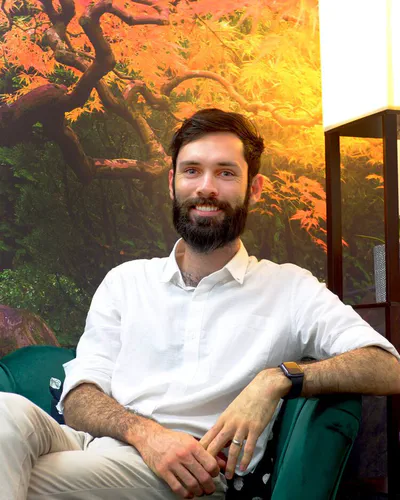
Felix Frain
Registered Psychologist
Hello, I’m Felix. I’m a Psychologist at Excel Psychology, and I’ve been a part of the team here for over ten years. I hold a Graduate Certificate of Mental Health Practice, a Postgraduate Diploma of Psychology, a Postgraduate Diploma of Psychology (Advanced), and a Master of Professional Psychology.
Would you like to see The Brisbane Channel’s video featuring Felix? Here’s a clip where Felix discusses a strategy for managing stress:
And here is the whole video.
In my role as a registered psychologist, I work with both individuals and couples who are looking for support with
- Anxiety, panic and phobias
- Depression and mood disorders
- Gender identity and sexuality
- Grief, loss and life transitions
- Interpersonal and relationship concerns
- Trauma and PTSD
- Neurodivergence (ADHD and ASD)
- Relationship difficulties (couples therapy)
- Stress, burnout and difficulties with motivation
I centre my therapeutic practice on being my authentic self in every session and meeting each of my clients where they’re truly at. With warmth and empathy, I hope to create a safe therapeutic space, free of judgement, for each and every client.
I take an integrative approach to therapy by utilising cognitive behavioural therapy (CBT) and dialectical behavioural therapy (DBT) and acceptance and commitment therapy (ACT) through an attachment and trauma informed therapeutic lens. I have also completed training in and draw from Gottman Relationship Therapy and Emotion Focused Therapy (EFT) when working with couples. I’m also an LGBTIQAP+ advocate and enjoy working with clients from this community who are seeking support with identity, sexuality and relationship concerns.
When I’m not busy around our practice, I’m usually found in my garden or running around a park with my beautiful greyhound x ridgeback rescue pup (or showing people photos of her).
I look forward to seeing you at our lovely practice.

A psychologist’s advice on how to cope with end of year burnout
As the end of the year approaches many of us begin an exhausted struggle to the finish line. The anticipation for some much needed downtime can start to make the days feel longer, the exhaustion feel somehow heavier, and the energy to be motivated or productive feeling like it needs a low power mode. As the stressors of the year have snowballed, alongside the looming pressures many of us face over the festive season, burnout may begin to tap us on the shoulder.

Our hardwired need for connection: let’s talk about attachment science
When it comes to understanding the way we experience human connection in our lives, from friends to family, attachment science has a lot to say. The science of attachment has developed categories of attachment styles, which are patterns of behaviour that can be observed in the way individuals form bonds with significant others. These are established in early childhood and extend throughout our lives. Our attachment style can contribute to how we experience and process emotions, the way we interact socially, and more broadly, our overall well-being. Attachment involves a deep, enduring connection that aligns with our needs from others, and the way that we communicate these needs, which can influence how we perceive, approach, and navigate our relationships.

The next generation of therapists: getting to know provisional psychologists

It’s been a lifetime: let’s talk about long term therapy

Couples therapy: when is it time to seek help?

The TikTok Doctor: What You Should Know About Social Media Self-Diagnosis
Social media has become such a prevalent part of modern day life which allows us to connect with others like never before. In many ways this has been a hugely beneficial platform, from instant updates from family and friends around the world to incredibly important videos of cute dogs, how-did-I-not-know-that life hacks, and even official government communication during a pandemic. There’s no denying that social media can bring joy, entertainment and meaningful connection. So what’s the catch?
